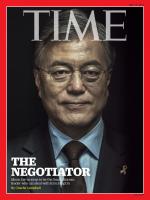ST writes about the role of South Korea in geopolitics. Also, ST discusses the crisis and changes in South Korea. ................................................................................................................Ed
The crisis gripping South Korea in 2017 is at its peak. The scandal involving ex-president Park Geun-hye led to a massive protest of 1.5 million people, eventually resulting into the impeachment of the former president. However, the impeachment was just the beginning. Globalization has started to shift with Brexit and the election of Donald Trump as the new US president. However, South Korea has been unable to deal with such international issues because of its own domestic problems. The Korean peninsula is also in crisis with North Korea’s 5th nuclear weapons testing and a pending 6th nuclear weapons experiment. The Terminal High Altitude Area Defense(THAAD) issue is also creating a strain in the diplomatic relations of America, China, and South Korea. Financial growth in South Korea has stalled, and South Korean society is severely divided in terms of ideology, generation, and region.
1. Security Issue

North Korea’s attempt to create nuclear weapons is still continuing, and even with the mounting pressure from both America and China, North Korea is not showing any signs of change. Its attempt to construct ballistic missiles is thought to be used to deliver nuclear weapons, leading South Korea to install the THAAD system. However, the major problem with THAAD is that China is strongly opposing its deployment, thus affecting its relationship with South Korea in terms of politics, economy, and culture. Also, the U.S. is pressuring South Korea to pay for the THAAD system, resulting into the conflict between the two countries. North Korea’s nuclear weapons experiment has led to a situation in which South Korea must not only deal with North Korea, but also with two superpowers.
2. Financial issue

The Ice Age in South Korea’s economy has started. According to the government’s statistics, the growth prospect of South Korea has reached the lowest point in its history with merely 2.6%. The degree of the financial crisis has dropped to a similar level when Korea was affected by the 1997 IMF and the 2008 global financial crisis. Some analysts even claim that South Korea has entered the stage of a long-term depression. Several experts believe that this year will be the critical year in which Korea either escapes from the crisis or dives into a deeper state of depression.
3. Internal Division
 Former president Park’s scandal became a spark in revealing a clear generational, ideological division in South Korean politics and society. Exit polls for the election of a new president showed a substantial division between people in their 20’s to 50’s and those over 60 years old. Around 50 percent of the people in the younger age groups voted for president Moon Jae-in of the Democratic Party, whereas the older generation mostly chose to vote for the Conservative Party. This phenomenon is significant because it reflects the differing national identities between the younger and older South Koreans.
Former president Park’s scandal became a spark in revealing a clear generational, ideological division in South Korean politics and society. Exit polls for the election of a new president showed a substantial division between people in their 20’s to 50’s and those over 60 years old. Around 50 percent of the people in the younger age groups voted for president Moon Jae-in of the Democratic Party, whereas the older generation mostly chose to vote for the Conservative Party. This phenomenon is significant because it reflects the differing national identities between the younger and older South Koreans. An Increase of Interest in Politics
The current crisis has led to the increase of people’s interest in politics. Before the 19th presidential election, the market research company, ‘Embrain Trend Monitor,’ conducted a survey among 1,000 voters whose age ranges from 20 to 59. According to the survey, 88.7% replied that they are interested in the 19th president election; and 66.7% replied that they will vote because voting is a right and a duty of the citizens in a democratic society. Moreover, 78.4% replied that they tend to examine closely the promise and the policy of the candidates.
On May 9th, the 19th president of South Korea was elected. The voter turnout was 77.2%, which is the highest rate in 20 years since the 15th presidential election, which was rated at 80.7%. The 19th presidential election in terms of voter turnout is 14.2% higher than the 17th election, and 5% higher than the 18th. One of the reasons that led to the increasing turnout was the introduction of the early voting system, which was held on May 4th and 5th, polling centers were open from 6 am to 8 pm, which were 2 hours longer than the last presidential election because of the by-election. Other reasons included the increase in overseas voter turnout and wider choices of candidates.
As a result of the election, Moon Jae-in became the new president of South Korea with 41.1% of the votes, which is 17.1% higher than Hong Joon-pyo, who got the second-highest number of votes. However, South Korea is still facing internal and external problems.

President Moon argued for the construction of a national unity government in his inaugural address. Many people anticipate that the new government will integrate various public sentiments into one. This will help solve complicated international problems such as THAAD and North Korea’s missile experiments. How President Moon will lead Korea through these difficult times is gaining attention from the world. Times, a prominent international magazine, published Moon as “The Negotiator,”
which signifies the crucial role President Moon has taken in the process of changing Korea.
저작권자 © The Soongsil Times(숭실대영자신문) 무단전재 및 재배포 금지


